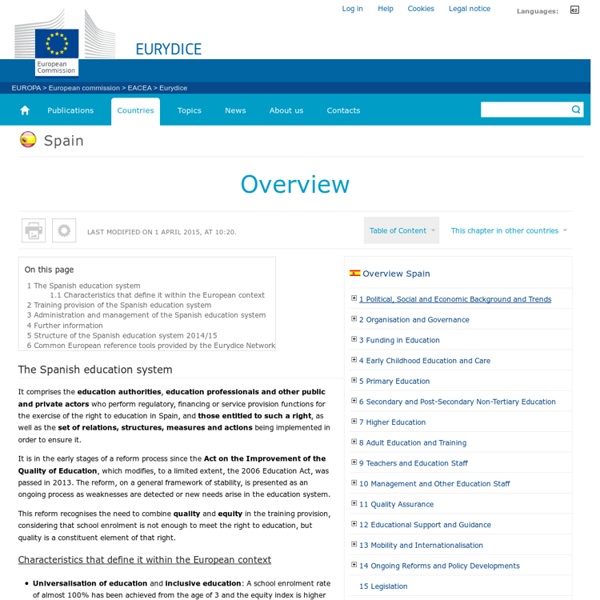Spain:Overview

Spain:Primary Education
The 2006 Organic Act on Education (LOE) establishes Primary Education as an educational level structured in three cycles each of them made up by two years, studied from 6 to 12 years old. The Spanish Ministry of Education, Culture and Sport (MECD) is responsible for setting the Core Curricula of this level, establishing the common objectives, contents and evaluation criteria for the whole State. The Education Authorities complete these aspects in their concerning management areas. Along with Lower Compulsory Secondary Education (ESO) it constitutes the basic, compulsory and cost-free education of the Spanish Education System. Both levels are aimed at assuring the development of the basic competences: those competences to be acquired by pupils by the end of Compulsory Education in order to be able to fulfil themselves, exercise an active citizenship, satisfactorily take part in adult life and develop lifelong learning. Aim and general objectives Schools providing Primary Education
Spain:Organisation of Primary Education
In order to guarantee the principle of equity in the exercise of the right to Education established by the 1978 Spanish Constitution, the Ministry of Education, Culture and Sport has historically determined the need to develop preventing and compensatory actions in those underprivileged areas, and to provide the economic resources and all the necessary support. On this manner inequalities derived from geographical, social, economic or other kind factors are avoided, and families can choose the preferred educational option for their children, regardless their place of residence. The Education Authorities are responsible for carrying out these actions, guaranteeing primary education students a free school place in their own municipality or schooling area, as well the most favourable conditions for the schooling of all the children whose personal conditions mean an initial inequality for progressing in the subsequent levels. Primary Education caters for children from 6 to 12 years old.
Spain:Primary Education
The 2006 Organic Act on Education (LOE) establishes Primary Education as an educational level structured in three cycles each of them made up by two years, studied from 6 to 12 years old. The Spanish Ministry of Education, Culture and Sport (MECD) is responsible for setting the Core Curricula of this level, establishing the common objectives, contents and evaluation criteria for the whole State. The Education Authorities complete these aspects in their concerning management areas. Along with Lower Compulsory Secondary Education (ESO) it constitutes the basic, compulsory and cost-free education of the Spanish Education System. Both levels are aimed at assuring the development of the basic competences: those competences to be acquired by pupils by the end of Compulsory Education in order to be able to fulfil themselves, exercise an active citizenship, satisfactorily take part in adult life and develop lifelong learning. Aim and general objectives Schools providing Primary Education
Spain:Administration and Governance at Local and/or Institutional Level
The 1978 Spanish Constitution established a model of decentralised State by which educational powers are shared between all levels of government. It is a symmetrical model, where the educational powers exercised are basically the same in each and every Autonomous Community. The competences in terms of education are shared between the State General Authority (Ministry of Education, Culture and Sport) and the Autonomous Communities (Regional Ministries or Departments of Education). In the Autonomous Cities of Ceuta and Melilla these competences are assumed by the Ministry of Education, Culture and Sport itself. The role of local authorities is focused on educational management through the Education Departments or Municipal Education Institutes. With this decentralisation model, the curriculum is formulated in a set of levels of application: Levels of curricular development Source: Drawn up by Eurydice Spain-REDIE from the regulations in force. Administration and governance at local level
Mind42: Free online mind mapping software
Related:
Related:



